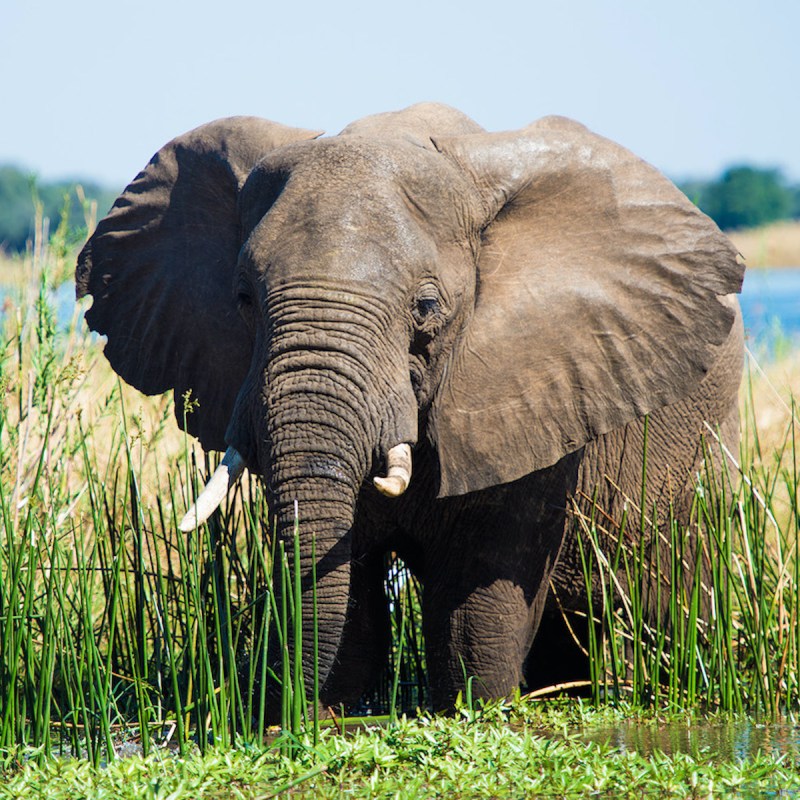
With huge ears, ivory tusks, and a long trunk, the African elephant is the largest land animal on earth. A bull elephant can grow up to 13 feet tall and weigh over 13,000 pounds, and when you’re that big, it takes a lot of food to fill you up! An elephant’s diet of roots, grasses, fruit, leaves, and bark is not high in nutrition, which means they have to go for quantity over quality. A really hungry adult elephant can consume as much as 600 pounds of food in a single day (though usually, it’s around 300 pounds). Such voracious appetites mean an elephant spends up to 16 hours a day eating. If you combine that with the huge distances they roam to find the quantities of food required to sustain their massive bodies, means there’s not much time left for sleeping!
Now let’s face it, what goes in must come out, and with all that eating, elephants can produce up to 220 pounds of dung in a day (to put this in perspective, the average giant panda weighs 220 pounds!) There’s an old proverb, “Waste Not, Want Not,” and with such vast quantities of “waste,” it’s not surprising that people have come up with some creative uses for the stuff that comes out the back end of an elephant.
So without much further ado, let’s look at some of the things you can do with all that poop.

1. Paper
This is one of my personal favorites.
Elephants have rather inefficient digestive systems, only digesting around 45 percent of what they eat. Elephants are herbivores, with very high fiber diets, so much of this undigested matter passes straight through them pretty much intact. Regular paper is made from wood fiber pulp, but a similar pulp can be derived from the fibers in elephant dung.
Nampath Paper is one of about 17 firms in Kenya that produces paper from elephant dung. John Matano of Nampath explained the process — “After washing, clean fibers remain. Then the fiber is boiled for four hours in a vat to thoroughly ensure it is clean. Then after that, much of the process is similar to that of making regular paper.” Matano goes on to say, “125 sheets of A4 paper can be produced from each 50kg (110lbs),” which is what an average elephant excretes every single day!
While “poo paper” might have a bit of a different texture than what we’re used to, I definitely think it’s worth a try! The dung can also be made into crafts and souvenirs.

2. Can I Interest You In Something To Drink?
You’ve probably heard of those (somewhat unethical) coffee beans that pass through the digestive systems of caged civets. The beans are collected from the civet’s waste; then washed, dried and roasted, before being sold for crazy sums of money. Someone in Thailand has come up with a similar idea but on a large scale! Instead of civets, a herd of captive elephants is excreting coffee beans that are made into coffee. Black Ivory Coffee produces about 475 pounds annually of what they call “the rarest coffee in the world,” and serves it in five-star resorts across Asia and the Middle East. The fermentation process elephants use to digest the cellulose in their food apparently brings out the sweet, fruity flavors in the beans and gives the coffee a chocolatey, cherry taste — but at $120 for just over a gram, I have to be honest and say I haven’t tasted it! (I’ve heard a rumor that for $500 a pound, the only shop outside of Asia that sells it is somewhere in Texas).
As far as I’m aware no one is producing elephant coffee in Africa, but there’s definitely something I can suggest to add to your drinks cabinet or next sundowners — Indlovu Gin. This is gin that has been infused with “botanicals foraged by elephants,” and sourced from their poop. The elephant dung is dried and goes through a sanitizing process, then rinsed and dried again, before the final dry product is infused into gin. Does it taste like poop, you may ask? Les Ansley, who together with his wife, founded Indlovu Gin says “It’s got an earthy, grassy-type flavor… depending on where we collect the botanicals or which elephants we collect botanicals from, the gin flavor is going to change slightly.” At $34 a bottle (with 15 percent of the profits going to the Africa Foundation to Support Elephant Conservation) this is a good souvenir of your African travels.
If you are looking for another novelty elephant-themed drink. let me point you in the direction of Japan’s Sankt Gallen Brewery and its beer called Un Kono Kuro, it’s made using coffee beans that have passed through an elephant, before undergoing alcoholic fermentation. The beer was so successful that initial stocks sold out online within minutes of its launch.

3. Insect Repellent
The African bush is an amazing place to spend some time, but you can find you are sharing the bush with a bunch of unwanted insect visitors — from ankle biting tsetse flies out on a game drive, to mosquitoes buzzing around your ears at night. And what happens if you don’t have insect repellent?
Luckily, I am not going to advise you to rub elephant poop on yourself! But what I am going to suggest is that you find yourself the nearest lump of dried elephant dung and light it. By burning a dried-up piece of dung, you can chase away most of those buzzy buggers, and the smell is much less offensive than most of those sprays.
Zambia’s Kafue National Park is renowned for its tsetse flies, and it can really ruin your afternoon game drive when these bloodsuckers swoop in to inflict you with painful and itchy bites. My first encounter with elephant dung as an insect repellent was at Mukambi Safari Lodge, where our guide hung a tin of smoldering elephant dung from the back of our game drive vehicle, and the biting flies, who always seem to find me particularly tasty, disappeared, almost instantly.
4. A Source Of Water
I sincerely hope you will never find yourself in the situation where squeezing a few drops of moisture out of a lump of fresh elephant poop is your only chance of survival. But let me tell you if you are ever lost or stranded, and out of water (in a place where elephants roam), the solution is at hand. Grab yourself a handful of fresh elephant dung and squeeze! But won’t it make me ill, you ask? No, elephant dung has surprisingly little bacteria, and let’s face it, any water is probably better than none in an emergency!

5. Medicinal
Elephants eat a wide variety of fruits and foliage. Traditional healers use many of these very same plants in natural remedies. Elephant excrement can actually be used as a pain relief medicine. Simply inhaling the smoke of smoldering elephant dung is said to work wonders on headaches or toothaches, and it’s also said to work to stop nose bleeds and unblock sinuses.
6. Fertilizer
Subsistence farmers have been using elephant dung as fertilizer for generations. With such poor digestive systems, elephant’s dung makes for excellent compost.
7. Biogas
Some zoos and sanctuaries are starting to make use of elephant dung, which, with the help of biogas digesters, can be used to generate gas for stoves, heat, and even electricity. With the sheer quantity of “material” the elephants provide, they are perfect candidates for this process. The digesters break down the organic waste and collect the methane and carbon dioxide produced, the bio-slurry created as a side product is a great fertilizer.
8. A Home For Wildlife
Granted this last use for elephant dung isn’t really for us humans, but a lump of elephant dung acts as home to many creatures. Scientists call elephants “ecosystem engineers.” Their feasting on trees and shrubs in forests creates pathways for smaller animals to move, and on the savannahs, they uproot trees and eat saplings, helping to keep the landscape open for plains animals to thrive. Numerous insects make their home in piles of elephant poop, including beetles, scorpions, crickets, termites, and millipedes. As well as being a highly nutritious home for these smaller creatures, it also benefits those who, in turn, want to eat those creatures. Honey badgers, mongooses, monkeys and a variety of birds will all scratch through dung piles, snacking on the bugs and grubs they find. To top it off, elephant dung is full of seeds, helping spread plants far and wide.

Bonus: When You Can’t Find An Apple
So there you have my suggestions for what to do with elephant poop next time you are on safari. I confess I was tempted to add a number 9 to this list and title it “A Perfect Gift,” but I knew my youngest son would never forgive me! He’s just turned 20, but it doesn’t really seem that long ago that we were on a family safari and a tiny voice came from the back seat of the car, asking us to stop because he wanted to “get a present for Miss Sarah.” Miss Sarah was the preschool teacher, and Tom had quite a crush on her. For some reason, my then 3-year-old son thought the surest way to Miss Sarah’s heart was to present her with a giant lump of elephant poop when he returned from holidays! We did stop. The lump of poop was carefully selected. And to give credit to Miss Sarah, she received the offering very graciously a few days later.
Before you visit Africa, check out these links:
